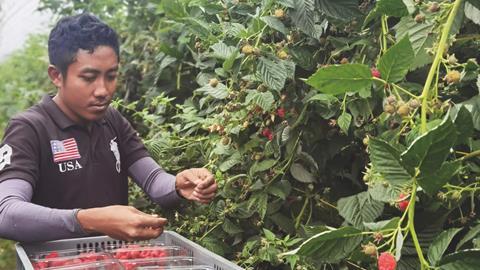Following the alleged exploitation of Indonesian seasonal workers last season, a group has been established to make recruitment and employment practices more responsible in future
An industry-wide taskforce has been set up to safeguard the rights of workers employed under the seasonal workers scheme.
The group – which includes trade bodies, retailers, growers, recruiters, and non-profits – will seek to improve the responsible recruitment and employment of migrant workers on UK farms, and work with government departments on the operation of the scheme.
Andrew Opie, director of food and sustainability at the British Retail Consortium, said: “Seasonal workers are an integral part of the supply chain, and only by working in partnership with farmers, scheme operators, enforcers, civil society, and the government, can we strengthen and improve the scheme for future workers.”
Concerns have been raised in previous seasons around exploitation risks faced by some migrant workers on seasonal worker visas during their recruitment and employment.
In February this year, recruitment agency AG Recruitment lost its license as a seasonal worker scheme operator after bringing Indonesian pickers to the UK who had debts of thousands of pounds to foreign brokers.
The Guardian revealed that some owed up to £5,000 to these unlicensed brokers when they arrived in Britain last year, despite only securing work for a single season. AG denied any wrongdoing and said it had no knowledge of Indonesian brokers charging money.
More than 200 Indonesian workers are also reported to have sought help from the country’s embassy last year after facing difficulties working on UK farms. According to The Guardian, many of these workers arrived late in the season and found there was not enough work to allow them to repay their debts. Some complained of receiving few hours after failing to meet challenging picking targets.
In response to the revelations, a series of multi-stakeholder roundtables were held in autumn 2022, aimed at developing practical solutions to respond to such risks.
As a result, a number of working groups were established and a series of projects were funded by UK supermarkets with industry input.
These included regional roadshows and a toolkit for good practice, a common assessment of scheme operators, and a multi-language worker-information app, funded by the scheme operators.
Moving forward, the taskforce will focus on improving the seasonal workers scheme within its current design.
Workstreams will include: improving workers’ access to information and communication; monitoring and improving practices during recruitment and on farm; and addressing recruitment fees paid by workers and boosting their overall earnings.
The taskforce will also engage with government departments and enforcement agencies on potential changes to scheme rules, regulation, oversight, and enforcement.
The taskforce is currently made up of over 50 organisations including retailers, growers, scheme operators, trade and membership associations, migrant worker community organisations, and non-profits.
The group’s activities will be co-ordinated by not-for-profit organisation Stronger Together and governed by a multi-stakeholder governance committee representing the members.
Producer’s perspective
One producer that has been involved from the outset is Clock House Farm, which received Indonesian workers that had allegedly paid substantial fees to unlicensed foreign brokers – without the company knowing this was the case.
Managing director Oli Pascall told FPJ that he would like growers to be allowed more involvement in the recruitment process in future, emphasising the difficult position that they are now put in as the end employer.
He also acknowledged the challenge that operators have in “ensuring the elimination of bad practice” in the home countries of potential staff, ahead of operators coming into contact with the potential recruit.
“We are working closely with operators and are encouraged by their hard work to date,” he said.
Pascall used to travel to the home countries of his pickers to meet them and carry out due diligence during the recruitment process. But when responsibility for recruiting seasonal workers was passed to licensed operators in 2019, producers had to take a step back due to the new legislation in the seasonal workers scheme.
Part of the problem last season was that workers were sourced from far and wide at very late notice, Pascall said.
He called for greater clarity and forward-planning from government on how the scheme will operate each season to allow the scheme’s operators “every chance of success” and to help avoid future exploitation of workers.
Pascall added that he expects the range of different source countries to be scaled back this year and for recruiters to focus more on European workers where possible.




